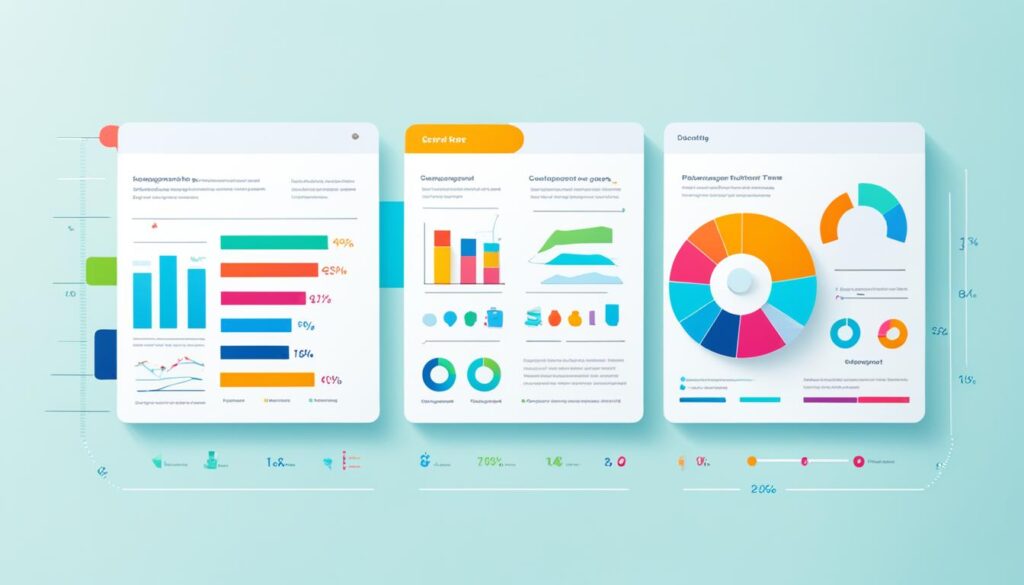
Welcome to my article on SEO engagement metrics. See how they boost interaction and conversion with SEO. User engagement is crucial for SEO success. It betters your website's ranks. By knowing and fixing user behavior metrics, you make sure your content meets user intent. This leads to more people seeing your site organically.
The bounce rate is key. It shows the percentage of people leaving after one page. Lowering this rate helps users find more on your site. They get interested in what you offer.
Time on site also matters. It shows how long users stay. The longer they stay, the more they value your content.
Click-through rate (CTR) is % of people clicking on your site from search results. High CTR means your content draws people in. They want to see what you have.
Social signals are important too. Like shares, comments, and URL mentions show your content is valued. It helps improve your SEO rank.
Conversions are key. Aim for users to make a purchase or join a newsletter. This drives both action and overall improvement.
Encouraging community involvement is vital. Such as comments and discussions on your site. It's good for users and search engines. They see your site as useful.
To win at SEO for the long term, improving engagement is crucial. Work on metrics, conversions, and community. It will make your site more visible and competitive in SEO.
Key Takeaways:
- User engagement is a vital ranking factor for SEO success.
- Metrics such as bounce rate, time on site, CTR, and social signals can indicate the quality and relevance of your content.
- Optimizing for conversions and building loyalty are key to driving interaction and conversion with SEO.
- Engaging user behavior, such as comments and community interaction, also adds value to search engines.
- Continuously improving user engagement alongside technical SEO foundations is essential for maintaining high organic visibility.
Importance of User Engagement for SEO Rankings
User engagement is key to get high SEO rankings. Search engines aim to provide top user experiences. Metrics like bounce rate, time on site, and click-through rate help them judge a website's quality.
Positive interaction with a website shows it's relevant. This boosts its rank in search results. By focusing on user engagement, websites improve their alignment with search algorithms. They then have a better chance at getting noticed more.
A crucial metric for engagement is bounce rate. It shows the percentage of visitors who exit after one page. A high bounce rate means users might not find what they need. This could be due to bad user experience. Lowering bounce rates by having engaging content can help in ranking higher.
Another key metric is the time users spend on a site. More time means users find the content valuable. Search engines see this as a positive sign. They take it to mean the website meets what searchers want.
Click-through rate (CTR) is also important. It shows the percentage of people who click a site after seeing it in search results. A high CTR indicates the site's content there is attractive. This can lead to more traffic and better rankings.

Social signals are big for user engagement and SEO. When users share or comment on a site's content, it signals the site's quality. This, in turn, helps its search ranking as search engines see it as relevant and satisfying.
User engagement is about more than SEO. It leads to more conversions, higher sales, and better ROI. Positive user experiences also build loyalty and encourage word-of-mouth marketing.
In sum, user engagement is crucial for good SEO. By working on metrics like bounce rate and click-through rate, websites can better their ranking. This meets search engines' goals of user satisfaction. It results in better visibility and ongoing SEO success.
Key User Engagement Metrics that Impact SEO Rankings
User engagement metrics are vital for a website’s success. They influence how well a site shows up in search results. By focusing on these metrics, a site can draw more visitors and boost sales. Let’s dive into the main metrics that affect SEO rankings.
Bounce Rate
A bounce rate shows how many people leave after one page. A high rate means visitors don’t see what they want. This can hurt a site's SEO. Fixing this issue keeps people on the site longer.
Time on Site
Search engines notice when people stay on a site longer. They see this as a sign the content is helpful. Longer visits can boost a site's search ranking. Great content can lure visitors to stay longer and explore more.
Click-Through Rate
CTR is about how many people click a search result. A higher rate means visitors found the site appealing. A well-structured title and description can up this rate, improving SEO.
Social Signals
Engagement on social media helps SEO. It shows search engines people like the site. Encouraging shares and comments can lead to better rankings.
Conversion Rate, Sales, and ROI Metrics
Engagement is linked to how much people buy or sign up. Clues like more newsletter sign-ups mean a site is engaging. Tracking these signs can lead to more sales and better ROI.

| Metric | Definition | Importance |
|---|---|---|
| Bounce Rate | The percentage of visitors who leave a website after viewing only one page. | A high bounce rate can negatively impact SEO rankings. |
| Time on Site | The average duration for which users stay on a webpage or website. | Higher time on site indicates greater engagement and relevancy of the content. |
| Click-Through Rate | The percentage of searchers who click on a specific result after seeing it in SERPs. | A higher CTR indicates stronger appeal and relevance to users. |
| Social Signals | User shares, likes, comments, and mentions of a URL on social media platforms. | Social signals demonstrate user engagement and content value. |
| Conversion Rate, Sales, and ROI Metrics | Metrics that measure the effectiveness of website conversions and the return on investment. | User engagement contributes to higher conversion rates, sales, and overall ROI. |
Improving these metrics can lead to better SEO standings. This helps a site stand out online.
Conclusion
User engagement is vital for SEO success. By improving metrics like bounce rate and click-through rate, sites can rank higher in searches. It's key to focus on making users happy since this meets both their needs and those of search engines.
Improving how users interact with a site, and strong technical SEO, maintains good search rankings. By making content great and the site easy to use, visibility and ranking can go up. This leads to better long-term SEO outcomes.
Search engines aim to show users the best content. Involving users well is key to boosting a site's SEO. It's important to prioritize engaging users for SEO success and more visitors from search engines.
FAQ
What are SEO engagement metrics?
SEO engagement metrics show how users interact with content on a site. They let search engines know if the content is good and relevant. These metrics look at bounce rate, time on site, click-through rate, and social signals.
How do user engagement metrics impact SEO rankings?
Search engines use user engagement metrics to see if a website offers a good experience. If people stay longer, click more, and share often, search engines think the site is valuable. Then, they rank the site higher in search results.
What are some key user engagement metrics that impact SEO rankings?
Several key user engagement metrics affect SEO rankings. These include bounce rate, time on site, click-through rate, and social signals. Bounce rate shows the percentage of visitors who leave after one page. Time on site means the average time users spend on a site. Click-through rate measures how many people click on a specific search result. Social signals are shares, likes, comments, and mentions on platforms.
How does user engagement contribute to driving interaction and conversion with SEO?
Better user engagement leads to higher rankings on search engines. When you work on bounce rate, time on site, click-through rate, and social signals, you improve SEO. This means more people visit your site and take action there, boosting your SEO results.











